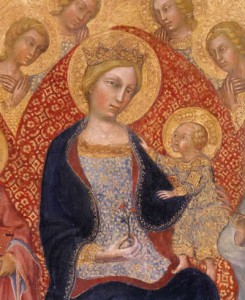
Scott Hahn with David Scott
The first Church council, the Council of Jerusalem we hear about in today’s First Reading, decided the shape of the Church as we know it.
Some Jewish Christians had wanted Gentile converts to be circumcised and obey all the complex ritual and purity laws of the Jews.
The council called this a heresy, again showing us that the Church in the divine plan is meant to be a worldwide family of God, no longer a covenant with just one nation.
Today’s Liturgy gives us a profound meditation on the nature and meaning of the Church.
The Church is One, as we see in the First Reading: “the Apostles [bishops] and presbyters [priests], in agreement with the whole Church [laity].” The Church is Holy, taught and guided by the Spirit that Jesus promises the Apostles in the Gospel.
The Church is Catholic, or universal, making known God’s ways of salvation to all peoples, ruling all in equity, as we sing in today’s Psalm.
And the Church, as John sees in the Second Reading, is Apostolic—founded on the twelve Apostles of the Lamb.
All these marks of the Church are underscored in the story of the council.
Notice that everybody, including Paul, looks to “Jerusalem [and] …the Apostles” to decide the Church’s true teaching. The Apostles, too, presume that Christian teachers need a “mandate from us.”
And we see the Spirit guiding the Apostles in all truth. Notice how they describe their ruling: “It is the decision of the Holy Spirit and of us.”
Knowing these truths about the Church, our hearts should never be troubled. The Liturgy’s message today is that the Church is the Lord’s, watched over and guarded by the Advocate, the Holy Spirit sent by the Father in the name of the Son.
This should fill us with confidence, free us to worship with exultation, inspire us to rededicate our lives to His Name—to love Jesus in our keeping of His Word, to rejoice that He and the Father in the Spirit have made their dwelling with us.
St. Teresa of Avila
Spiritual Testimonies, 49, 51
Once while I was recollected in this company I always bear with me in my soul, God seemed so present to me that I thought of St. Peter’s words: “You are the Christ, Son of the Living God” (Mt 16,16). For God was thus living in my soul.
This presence is not like other visions, because it is accompanied by such living faith that one cannot doubt that the Trinity is in our souls by presence, power, and essence. It is an extremely beneficial thing to understand this truth. Since I was amazed to see such majesty in something so lowly as my soul, I heard: “It is not lowly, daughter, for it is made in my image” (Gn 1,27).
Once while with this presence of the three Persons that I carry about in my soul, I experienced so much light you couldn’t doubt the living and true God was there… I was reflecting upon how arduous a life this is that deprives us of being always in that wonderful company, and… the Lord said to me: “Think, daughter, of how after this life is finished you will not be able to serve me in ways you can now. Eat for me and sleep for me, and let everything you do be for me, as though you no longer lived but I; for this is what St. Paul was speaking of” (Gal 2,20).
St. Gregory the Great
Homilies on the Gospels, no. 30
“We will come to him and make our dwelling with him”
“My Father will love him, and we will come to him and make our home with him.” Consider, dearly beloved, how great this solemnity is that commemorates the coming of God as a guest in our hearts. If some rich and powerful friend were to enter your home, you would quickly clean the entire house for fear something there might offend your friend’s eyes when he entered. Let anyone then who is preparing his inner house for God cleanse away the dirt of his evil deeds.
You see what Truth tells us: “We will come and make our home with him.” He does indeed enter the hearts of some but does not make his home there, because through repentance they acquire respect for God, but during a time of temptation they forget that they have repented and so return to committing sins as if they had never wept over them at all. The Lord comes into the heart and makes his home in one who truly loves God and observes his commandments since the love of his divine nature so penetrates him that he does not turn away from it during times of temptation. That person loves truly whose heart does not consent to be overcome by wicked pleasures… Hence the following clarification: “Whoever does not love me does not keep my words.” Dearly beloved, enter into yourselves and inquire if you truly love God. But let no one believe the answer his heart gives in his own case apart from the testimony of his works.
